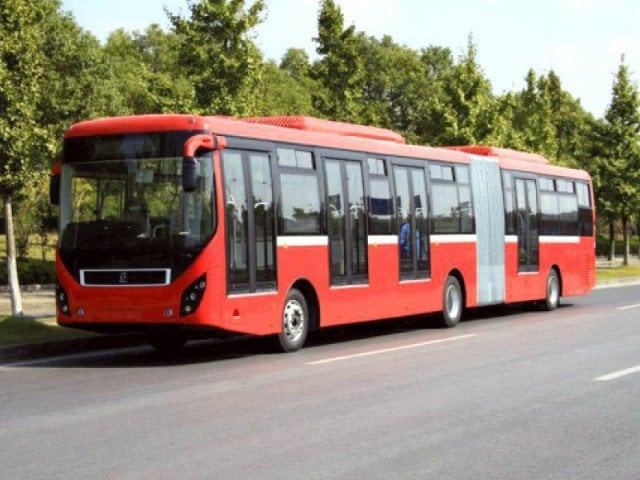Peshawar Bus Rapid Transit project in slow lane
Without depots, charging and refuelling points, hybrid buses cannot be rolled out

The CEO of the project’s special purpose vehicle, TransPeshawar, was removed when he refused to accelerate the procurement of hybrid diesel buses for politically motivated reasons.
PHOTO: EXPRESS
The recently completed new Islamabad airport is a textbook example of how changes in design, poor organisational management and an utter disregard for best practices affected the project’s baselines.
Same is the case with Peshawar Bus Rapid Transit (BRT) project whose fate seems to be hanging in the balance. However, this fiasco is not the result of typical pork-barrel politics in which public funds are channeled into lobbies of alliances, but is mainly due to the technological sublime associated with a totally new and less understood technology – hybrid diesel buses.
The CEO of the project’s special purpose vehicle, TransPeshawar, was removed when he refused to accelerate the procurement of hybrid diesel buses for politically motivated reasons.
He argued that the purchase of buses without first completing construction of a designated bus depot would lead to escalation of project costs and that he had a fiduciary duty to act in the best interest of public.
Rest of the C-Suite officials also tendered their resignation in protest. What the political leadership failed to understand here is that without depots, charging and refuelling points, these hybrid buses cannot be rolled out.
The technology needs to be tested by subject matter specialists before the vendor – Xiamen Golden Dragon Bus Co Ltd – is given the thumbs up for the delivery of 220 buses. So, there is little room to fast track the project and things will work at their natural clock speed.
However, the government still paid $25,000 in freight charges to transport a demo bus so that the chief minister could inaugurate it before elections, though completion of the project is nowhere in sight.
The project was originally scheduled to be finished by January 2018 with a budget of Rs55.9 billion which has now inflated to over Rs62 billion. The main reason for the cost escalation and schedule slips is the project’s scope creep as the corridor’s master plan has been modified more than 10 times.
For example, key decisions for project design regarding the Gulbahar flyover and the existing Arbab Sikandar Khan Khalil flyover were taken at the eleventh hour.
First BRT bus reaches Peshawar
Similarly, the project was extended to Khyber Road during the execution phase, which further ballooned project costs, exerting more pressure on the contractor to accelerate civil works.
This, however, is being done while ignoring best practices related to sustainability in project execution.
For example, the Environment Impact Assessment (EIA) report of the Peshawar BRT project indicated that though minimal or no utility infrastructure would be affected, in case any direct or indirect damage to the neighbourhood or local businesses is caused, the contractor would be liable for a full compensation.
However, we observe that damage to gas pipelines by untrained contract workers is no longer an exception and has become quite a regular nuisance for local residents, businesses and utility companies. Moreover, any compensation by the contractor seems to be totally out of question.
Outsourcing the project
However, unlike the Punjab government, the Khyber-Pakhtunkhwa (K-P) government would outsource operations and maintenance of the Peshawar BRT infrastructure to a third party and would not be subsidising bus fares. This is a step in the right direction and will not create market anomalies in the long run.
CM Khattak insists on completing Bus Rapid Transit by April 30
The K-P government also has an opportunity to complete first phase of the BRT project with the help of Asian Development Bank and later switch to a full public-private partnership (PPP) mode for further extension of BRT routes.
The success story of the pilot project will help the government raise cheap private money for future investments. Participation of private sector in infrastructure projects will also increase the value for money as project components like design and realisation will be contracted out jointly, which will lead to better quality and efficiency returns.
This model is not only being used in the UK, France, the Netherlands and the US, but also in Asian countries like China and Hong Kong.
Design changes to delay Peshawar BRT project
The Cross Harbour Tunnel project under the Victoria Harbour was completed with significant private capital and later on, four additional tunnels were realised, building on the success of the pilot project.
The writer is a Cambridge graduate and is working as a strategy consultant. He tweets at @faranmah
Published in The Express Tribune, June 25th, 2018.
Like Business on Facebook, follow @TribuneBiz on Twitter to stay informed and join in the conversation.



















COMMENTS
Comments are moderated and generally will be posted if they are on-topic and not abusive.
For more information, please see our Comments FAQ